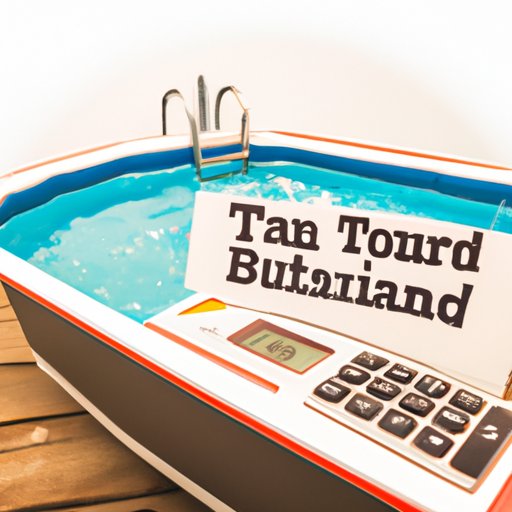Introduction
A hot tub is a large, heated pool or tub that is used for relaxation and hydrotherapy. Not only can they provide therapeutic relief from sore muscles and stress, but they are also great for entertaining friends and family. With the right financing plan, owning a hot tub can be an affordable and enjoyable experience.
When considering a hot tub, it is important to have an understanding of the costs associated with ownership, as well as the various financing options available. This article will provide an overview of the cost and financing options for purchasing a hot tub.

Calculating the Cost of Owning a Hot Tub
The initial cost of purchasing a hot tub will depend on the size, features, and quality of the model you choose. Prices typically range from $2,000 to $20,000. In addition to the purchase price, there are other costs associated with owning a hot tub, such as installation, delivery, and ongoing maintenance and upkeep.
Initial Costs
In addition to the hot tub itself, there are several other expenses that must be taken into account when calculating the cost of ownership. These include the cost of installation, delivery, and any additional accessories or features that you may want to add. Installation costs will vary depending on the type of hot tub you choose and the complexity of the installation, but can range from $500 to $1,500.
Ongoing Maintenance and Upkeep Costs
In order to keep your hot tub in good condition, there are certain maintenance and upkeep costs that must be taken into consideration. These include the cost of chemicals, filters, and covers, as well as regular cleaning and servicing. Depending on the size of your hot tub and the frequency of use, these costs can range from $50 to $200 per month.
Financing Options for Purchasing a Hot Tub
Once you have determined the cost of buying and maintaining a hot tub, you will need to decide how to finance the purchase. There are several financing options available, including home equity loans, personal loans, credit cards, and manufacturer financing.
Home Equity Loans
A home equity loan is a loan taken out against the value of your home. This type of loan offers a number of advantages, including lower interest rates and longer repayment terms. However, it is important to remember that if you default on the loan, you could risk losing your home.
Personal Loans
Personal loans are unsecured loans that can be used for a variety of purposes, including financing a hot tub. Personal loans typically offer competitive interest rates and flexible repayment terms, making them a popular option for many hot tub buyers. However, it is important to make sure that you can afford the monthly payments before taking out a loan.
Credit Cards
Using a credit card is another option for financing a hot tub. Credit cards offer convenience and flexibility, but it is important to remember that they typically have higher interest rates than other financing options. Additionally, it is important to make sure that you can pay off the balance in full each month in order to avoid high interest charges.
Manufacturer Financing
Many hot tub manufacturers offer their own financing plans, which can be a great way to finance your purchase. These plans usually offer competitive rates and flexible repayment terms, and can make the process of buying a hot tub much easier. However, it is important to compare the terms of the manufacturer financing with other financing options before making a decision.

Tips on Budgeting for a Hot Tub
Before committing to a financing plan, it is important to create a realistic budget that takes into account all of the costs associated with owning a hot tub. This includes the initial purchase price, installation costs, ongoing maintenance and upkeep costs, and any potential financing costs. It is also important to set aside money for unexpected expenses, such as repairs or replacements.
How to Choose the Right Financial Plan for a Hot Tub
Once you have created a budget and decided on a financing plan, it is important to compare the interest rates and monthly payments of different plans. Additionally, it is important to understand any fees or penalties associated with the financing plan, as these can have a significant impact on the overall cost of ownership.

Understanding the Benefits and Challenges of Financing a Hot Tub
Financing a hot tub has both advantages and disadvantages. The primary benefit is the ability to spread out the cost of the purchase over time, making it more affordable. However, it is important to remember that financing a hot tub will incur additional costs in the form of interest payments. Additionally, if you miss a payment, you may face late fees or even repossession of the hot tub.
Conclusion
Owning a hot tub can be a rewarding and enjoyable experience, but it is important to understand the cost and financing options available. By calculating the cost of ownership and exploring different financing options, you can find the best plan for your budget. Additionally, it is important to understand the benefits and challenges associated with financing a hot tub, as this can help you make an informed decision.
(Note: Is this article not meeting your expectations? Do you have knowledge or insights to share? Unlock new opportunities and expand your reach by joining our authors team. Click Registration to join us and share your expertise with our readers.)
